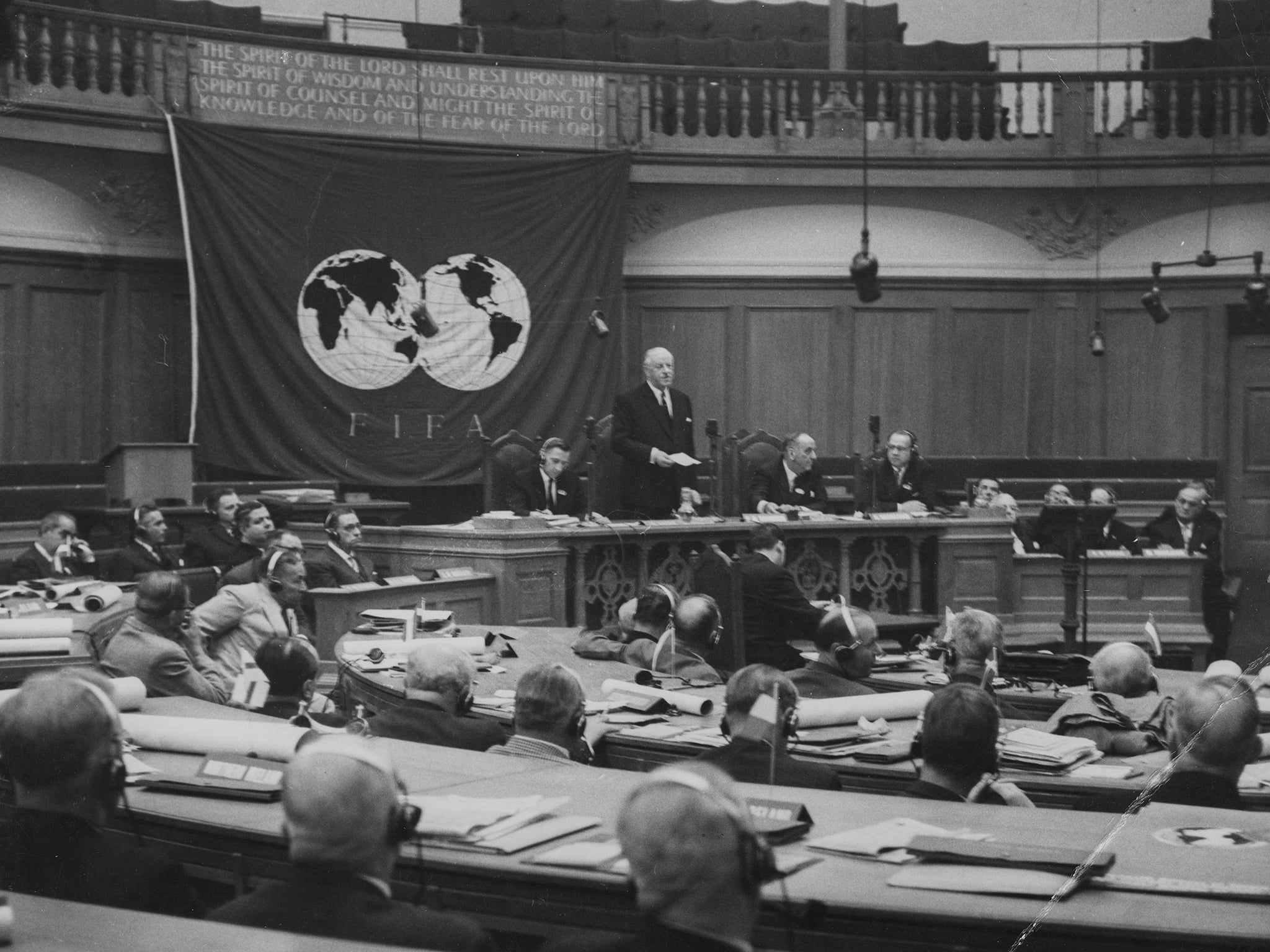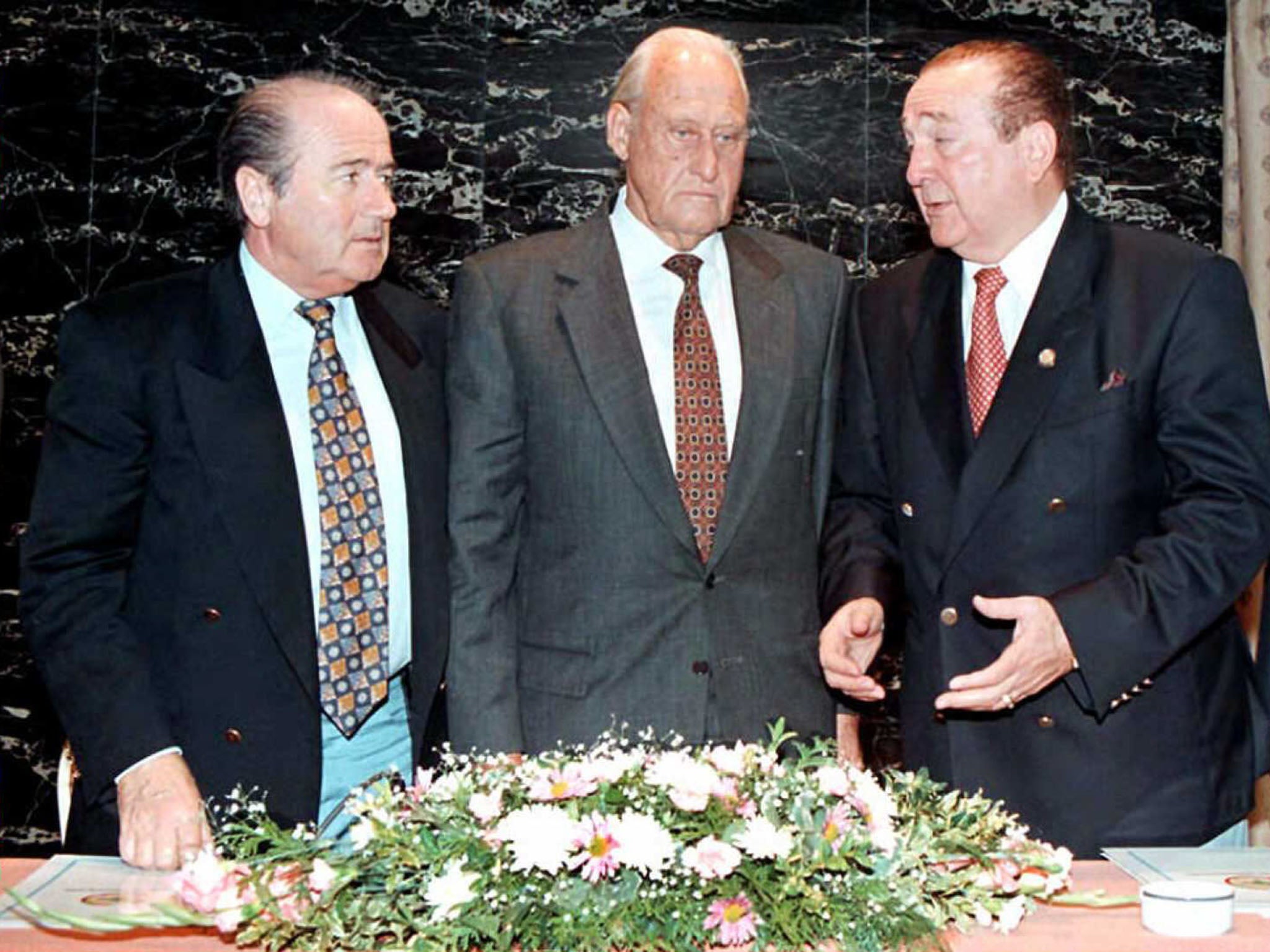Remembering the 1974 Fifa Congress, when a World Cup of 24 was fought for, and one of 48 was unfathomable
Frankfurt in 1974 saw Stanley Rous replaced as president with Joao Havelange and football was changed forever
Frankfurt was an apt place to host the 1974 Fifa Congress – a city based in a country split in two.
English football was about to discover that the same could be said for the world game.
There is always something to debate on the eve of a World Cup, although the hottest potential talking point in Moscow on the eve of this tournament – that of expanding the competition to 48 teams – has been dropped from the agenda entirely.
In the then West Germany, 44 years ago, something far more fundamental was at stake.
Sir Stanley Rous, the bespectacled former referee who had been the president of world football’s governing body since 1961, was a fierce protector of the sport’s traditions – a tradition which, ironically enough given recent discussions, focused on keeping the World Cup a relatively tight knit affair.
Under Rous’s watch, the tournament had remained one involving 16 teams, the majority of which came from Europe and South America. Morocco had been the first African side to qualify for the tournament since 1934 in Mexico in 1970, while Australia had also made the 1974 finals in West Germany but these were isolated examples of the World Cup being exactly that.
The thought of expanding the competition threefold – as mooted in the past two years – would have blown the mind of this most traditional of Englishman.
It’s a proposal, though, that would undoubtedly have had the support of his opponent in a bloody Fifa election that saw power grabbed ruthlessly from English hands.
Joao Havelange was a former Olympian, having competed in the pool for Brazil in Berlin in 1936 and at water polo at the Helsinki Games of 1952.

It was outside of the water, though, that Havelange had made a splash, showing the kind of business acumen that would have been anathema to Rous, the former school teacher.
His confidence and belief that world football would never change until it was placed in the hands of someone from outside Europe sustained him from the very opening of his campaign.
Rous had succeeded in making the 1970 World Cup a truly global spectacle – broadcasting the competition in glorious technicolour to a world audience for the first time – but Havelange’s relationship with potential sponsors such as Adidas and Coca-Cola promised to utterly transform international football’s flagship event.
“There was a strong sense across a lot of the football world that the game was a European venture and that Fifa should really operate in the interests of the European game and the European football nations,” said Paul Darby, author of Stanley Rous’s ‘Own goal’: football politics, South Africa and the contest for the Fifa presidency in 1974.
“There was a desire to ensure that that remained the case. Any time the African nations sought to use Fifa or world football as a vehicle for registering their presence on the international stage, they were met with resistance. They were met with narrow European self-interest.”
It was this that Havelange was seeking to change. The Brazilian, who died at the age of 100 in August 2016, had embarked on a whistlestop tour of the world in a bid to win support for his campaign. Before the Frankfurt Congress, he had visited 80 different countries and made promises of improving infrastructure and, most crucially, expanding representation at the World Cup.
That was enough for most.
Rous, meanwhile, went about his business is his usual methodical way – working primarily from his home in London rather than the luxury office in Zurich which current Fifa President, Gianni Infantino, now calls home.
Speaking to FourFourTwo in 2016, Rous’s former personal assistant, Rose-Marie Breitenstein, outlined Rous’s philosophy from the day he became president until the day he left the organisation.

“Sponsorship came into the game (during his reign in charge of Fifa) but for him, he wasn’t a financier, he was a former school master,” she says. “His interests were in education and finance was not quite his forte. I think with the sponsorship and the money involved, he would not like that at all. I don’t think he would be very fond of the game now because that’s what he thought it was, it was a game, played for recreation and enjoyment.”
As Fifa members prepared to vote on the eve of the first match of the 1974 World Cup, Havelange could sense that there was a mood for change. And the status quo campaigned for vigorously by his English opponent was about to go flying out the window.
Havelange whirred around the congress hall, shoring up support for his plans for a brave new world. Rous was statuesque in comparison and clearly feared the worse. A short time previously, he had addressed a Uefa meeting in Edinburgh, calling for European assistance in seeing off his Brazilian opponent.
“I appeal to you to vote for me because it is Europe versus South America and we want Europe to retain the leadership of football,” he said. “If I am elected for a further term you should immediately look for a successor from Europe so that this European leadership is maintained.”
The reality was that there was only so much Europe could do.
In the end, the vote went to a second round but, like England at the tournament in West Germany, Rous was never in it. Havelange won the next comfortably, seeing off the Englishman’s challenge by 15 votes.
The Brazilian offered Rous a kiss and a bouquet of flowers by means of compensation.
“For them they are a bouquet, while mine is more in the nature of a wreath,” said Rous. “It will be difficult to realise I’m no longer president.”
By the time the 1982 World Cup rolled around there were 24 teams at the tournament, by 1998 there were 32. The last tournament in Brazil was worth an estimated $4.4bn. In four years’ time, the competition will be hosted by Qatar. Almost certainly in winter.
Even Havelange might be surprised at just how much the game has changed. Rous would be staggered.
Join our commenting forum
Join thought-provoking conversations, follow other Independent readers and see their replies
Comments
Bookmark popover
Removed from bookmarks